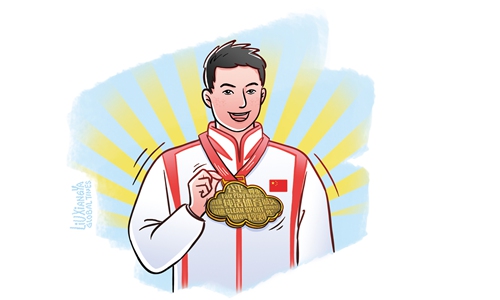
Illustration: Liu Xiangya/GT
The relentless spotlight that the US has placed on the 2021 incident involving 23 Chinese swimmers who tested positive for trimetazidine (TMZ) due to inadvertent contamination reflects a broader, more strategic aim: to undermine China's emerging challenge to US dominance in swimming ahead of the Paris 2024 Olympics.
This maneuver also serves multiple purposes for the US, including tarnishing the reputation of the World Anti-Doping Agency (WADA) and diverting attention from its shortcomings in its own anti-doping measures.
In June 2021, the Chinese Anti-Doping Agency (CHINADA) accepted that the swimmers tested positive for TMZ due to inadvertent contamination. WADA's extensive review on CHINADA's report, including consultations with independent experts and additional scientific investigations, concluded that the contamination scenario was reasonable, resulting in no fault or negligence attributed to the athletes.
Despite this, the US Anti-Doping Agency (USADA) has continued to question the integrity of this decision, even suggesting that the positive cases were hidden, despite clear evidence to the contrary. But the timing comes just weeks ahead of the Paris Olympics rather than when it acknowledged the issue in 2023.
An independent report by Swiss prosecutor Eric Cottier looking into whether proper procedures were followed by anti-doping and swimming officials was also expected to be made public on Tuesday.
A hearing in June by the US House Committee on Energy and Commerce exemplifies the politicization of this relatively straightforward contamination case. The hearing, ostensibly about preparing for the 2024 Olympics, focused disproportionately on this 2021 case, leveraging it to cast doubt on China's sportsmanship and WADA's transparency. US Anti-Doping Agency CEO Travis Tygart led the charge, accusing WADA and other countries of not adhering to the rules, while conveniently ignoring significant gaps in the US anti-doping system.
According to WADA, the USADA's own record raises questions about its credibility to lecture other nations. In 2023, USADA collected 7,773 samples from 3,011 athletes, a number that pales in comparison to similar agencies in Germany and France, which operate with smaller budgets. Moreover, USADA's failure to adequately test 31 percent of US athletes under its jurisdiction in the year leading up to the Tokyo Games further underscores its inefficiencies. Yet, instead of addressing these internal issues, USADA diverts attention by undermining confidence in international competitors.
The case of US sprinter Erriyon Knighton highlights USADA's inconsistencies. Initially pushing for a four-year sanction after Knighton tested positive for a metabolite of trenbolone in March, the USADA abruptly changed its stance, declaring "justice was served."
The aggressive narrative pushed by the US has profound implications for Chinese swimmers. The public listing of affected athletes' names, including minors, constitutes a severe breach of privacy and athlete rights. This would not be tolerated if the roles were reversed, with Chinese authorities demanding similar transparency from US athletes. The psychological impact on the Chinese athletes, as they prepare for the Paris Olympics under intense scrutiny and media harassment, cannot be overstated.
The larger context reveals a strategic attempt by the US to destabilize China's preparations and performance in swimming, a sport where China has rapidly closed the gap with the US. The Tokyo Olympics in 2021 saw the US dominate with 11 gold medals in the sport, while China earned only three. However, recent world championships competitions indicate a narrowing margin, with China poised to challenge US supremacy.
The US campaign against the 23 Chinese swimmers is less about upholding the integrity of sports and more about securing an edge for US athletes. This politicization not only undermines WADA's efforts but also poses significant challenges for Chinese athletes striving to compete on an equal footing, unfairly discrediting China's long-standing zero-tolerance policy toward doping. By keeping the focus on past controversies and unproven allegations, the US seeks to create a cloud of doubt around Chinese athletes. This tactic is not just unfair, it is detrimental to the spirit of fair play.
The psychological warfare extends beyond the swimmers themselves. The constant barrage of accusations and the subsequent media frenzy place immense pressure on Chinese sports authorities and anti-doping bodies. They are forced to defend their integrity repeatedly, diverting attention and resources from their primary mission: to ensure the well-being of the athletes. This environment of suspicion and hostility ultimately harms the global sports community, eroding the trust that is essential for international competitions.
It is imperative for the global sports community to see through these tactics and support a fair, unbiased approach to anti-doping that protects athletes' rights and promotes true sportsmanship. The sports world should be a realm where athletes from all nations compete fairly, based on their abilities and efforts, not a battleground for political agendas. Only by maintaining a clear focus on these principles can we ensure that the true spirit of the Olympics and other international competitions endures.
The author is a reporter with the Global Times. life@globaltimes.com.cn




